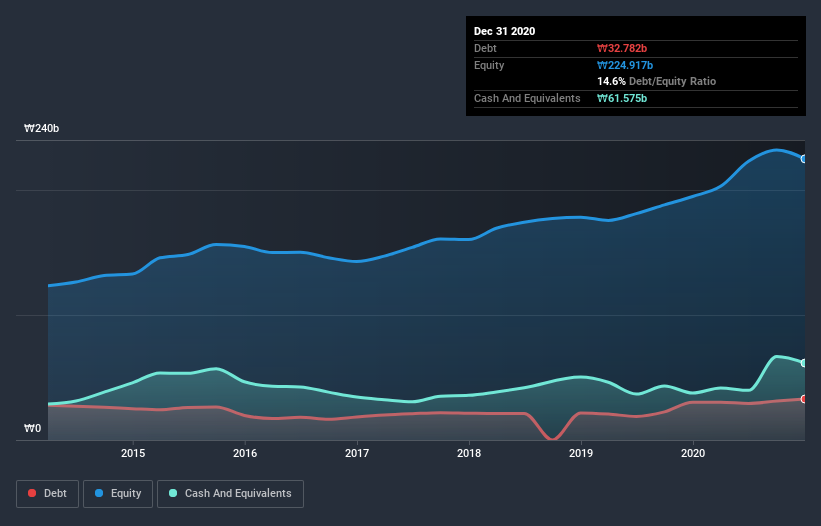- South Korea
- /
- Semiconductors
- /
- KOSDAQ:A131290
These 4 Measures Indicate That TSE (KOSDAQ:131290) Is Using Debt Reasonably Well
Warren Buffett famously said, 'Volatility is far from synonymous with risk.' When we think about how risky a company is, we always like to look at its use of debt, since debt overload can lead to ruin. We note that TSE Co., Ltd (KOSDAQ:131290) does have debt on its balance sheet. But the more important question is: how much risk is that debt creating?
Why Does Debt Bring Risk?
Debt assists a business until the business has trouble paying it off, either with new capital or with free cash flow. Ultimately, if the company can't fulfill its legal obligations to repay debt, shareholders could walk away with nothing. However, a more frequent (but still costly) occurrence is where a company must issue shares at bargain-basement prices, permanently diluting shareholders, just to shore up its balance sheet. Of course, plenty of companies use debt to fund growth, without any negative consequences. The first thing to do when considering how much debt a business uses is to look at its cash and debt together.
Check out our latest analysis for TSE
What Is TSE's Net Debt?
The image below, which you can click on for greater detail, shows that at December 2020 TSE had debt of ₩32.8b, up from ₩30.2b in one year. However, it does have ₩61.6b in cash offsetting this, leading to net cash of ₩28.8b.

How Healthy Is TSE's Balance Sheet?
The latest balance sheet data shows that TSE had liabilities of ₩60.4b due within a year, and liabilities of ₩15.8b falling due after that. Offsetting these obligations, it had cash of ₩61.6b as well as receivables valued at ₩45.1b due within 12 months. So it actually has ₩30.6b more liquid assets than total liabilities.
This short term liquidity is a sign that TSE could probably pay off its debt with ease, as its balance sheet is far from stretched. Succinctly put, TSE boasts net cash, so it's fair to say it does not have a heavy debt load!
Better yet, TSE grew its EBIT by 105% last year, which is an impressive improvement. That boost will make it even easier to pay down debt going forward. When analysing debt levels, the balance sheet is the obvious place to start. But ultimately the future profitability of the business will decide if TSE can strengthen its balance sheet over time. So if you want to see what the professionals think, you might find this free report on analyst profit forecasts to be interesting.
Finally, a company can only pay off debt with cold hard cash, not accounting profits. While TSE has net cash on its balance sheet, it's still worth taking a look at its ability to convert earnings before interest and tax (EBIT) to free cash flow, to help us understand how quickly it is building (or eroding) that cash balance. In the last three years, TSE created free cash flow amounting to 7.5% of its EBIT, an uninspiring performance. That limp level of cash conversion undermines its ability to manage and pay down debt.
Summing up
While it is always sensible to investigate a company's debt, in this case TSE has ₩28.8b in net cash and a decent-looking balance sheet. And we liked the look of last year's 105% year-on-year EBIT growth. So is TSE's debt a risk? It doesn't seem so to us. There's no doubt that we learn most about debt from the balance sheet. However, not all investment risk resides within the balance sheet - far from it. Be aware that TSE is showing 2 warning signs in our investment analysis , you should know about...
When all is said and done, sometimes its easier to focus on companies that don't even need debt. Readers can access a list of growth stocks with zero net debt 100% free, right now.
If you’re looking to trade TSE, open an account with the lowest-cost* platform trusted by professionals, Interactive Brokers. Their clients from over 200 countries and territories trade stocks, options, futures, forex, bonds and funds worldwide from a single integrated account. Promoted
Valuation is complex, but we're here to simplify it.
Discover if TSE might be undervalued or overvalued with our detailed analysis, featuring fair value estimates, potential risks, dividends, insider trades, and its financial condition.
Access Free AnalysisThis article by Simply Wall St is general in nature. It does not constitute a recommendation to buy or sell any stock, and does not take account of your objectives, or your financial situation. We aim to bring you long-term focused analysis driven by fundamental data. Note that our analysis may not factor in the latest price-sensitive company announcements or qualitative material. Simply Wall St has no position in any stocks mentioned.
*Interactive Brokers Rated Lowest Cost Broker by StockBrokers.com Annual Online Review 2020
Have feedback on this article? Concerned about the content? Get in touch with us directly. Alternatively, email editorial-team (at) simplywallst.com.
About KOSDAQ:A131290
TSE
Provides semiconductor test solutions in South Korea and internationally.
Flawless balance sheet with proven track record.
Similar Companies
Market Insights
Community Narratives



